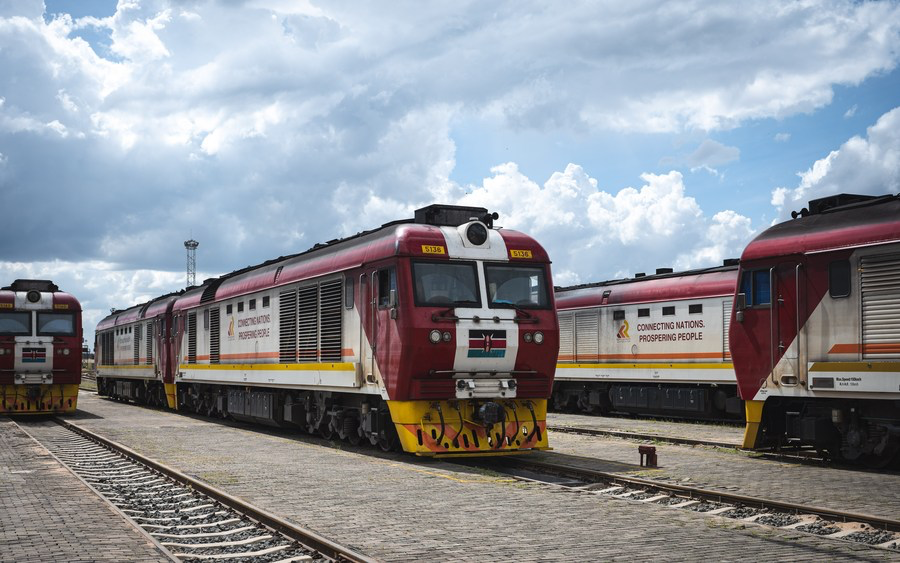Published: July 06,2023
By Paul Frimpong

This photo taken on May 23, 2023 shows trains of the Mombasa-Nairobi Railway in Nairobi, Kenya. The Mombasa-Nairobi Standard Gauge Railway in Kenya has become a flagship project of China-Africa cooperation, a “business card” of Chinese enterprises and a demonstration project of the Belt and Road Initiative.(Xinhua/Wang Guansen)
It’s an undisputed fact that China currently sits at the top of the list of countries with the ability, speed, and value for money when it comes to developing the infrastructure that is needed in Africa. Africa can push forward its infrastructure development more quickly and at a very high value for its money with China’s support.
From the 1990s through the early 2000s, the African continent experienced a plethora of crises that crippled its growth potential and left millions in abject poverty.
In May 2000, the entire continent of Africa was labeled “the hopeless continent” by The Economist magazine. This, in many ways, was the broader sentiment shared by Europe and the West, led by the United States.
Africa was seen as nothing less than a death zone and certainly not a place to do business or invest. The continent was used as a do-good aid dumping ground. This sentiment, however, was not shared by China.
If you are a keen follower of the Africa-China relationship in any form or shape, then you will probably be familiar with the Forum on China-Africa Cooperation (FOCAC). FOCAC, as it has become known, was established and first held in October 2000 in Beijing as a triennial platform to build cooperation between Africa and China across key areas of interest. Twenty-two years later, FOCAC continues to serve its purpose as a platform for collective discourse on cooperation between Africa and China.
Juxtaposing the two scenarios — within the same year of 2000, the West labeled the African continent as hopeless, while China hosted the first FOCAC — one cannot overemphasize its significance enough.
As the continent’s traditional partners, mostly Western countries did not see Africa as a place to do business, little to no real investments were made during the 1990s.
But China acted differently. Chinese foreign direct investment annual flows to Africa, also known as overseas foreign direct investment in China’s official reports, have been increasing steadily since 2003.
Countries across the continent have been exploring bilateral, multilateral, and, until recently, the issuance of Eurobonds to finance infrastructure. However, for over two decades, no country has invested more in Africa’s infrastructure development than China.
This photo shows the exhibition area of African foods and agricultural products during the third China-Africa Economic and Trade Expo at the Changsha International Convention and Exhibition Center in Changsha, central China’s Hunan Province, June 29, 2023.(Xinhua/Chen Yehua)
It’s an undisputed fact that China currently sits at the top of the list of countries with the ability, speed, and value for money when it comes to developing the infrastructure that is needed in Africa. Africa can push forward its infrastructure development more quickly and at a very high value for its money with China’s support.
The size of a country does not matter when it comes to bilateral relationships with mutual respect — this is a core part of China’s foreign policy. China’s act of respect for the African continent is very significant and has contributed to the close ties between Africa and China.
For example — and this has become a tradition — each year since 2000, Africa has been first on the list of foreign visits by China’s foreign minister. But the same cannot be said of the continent’s traditional Western counterparts.
For most countries in the Global South, and Africa in particular, China’s economic model and success are inspiring enough: It is a country that has been able to lift over 800 million people out of poverty and become a beacon of infrastructure development globally.
Countries in Africa also need the same roads, rails, healthcare, quality and innovative education, manufacturing boom, etc., as China has successfully achieved. The model of economic transformation and experience-sharing is also making China an attractive partner for the African continent.
The growing momentum of Africa-China cooperation is not changing anytime soon.
To succeed in Africa, you need to be built for Africa. China has shown itself to be the most reliable partner seeking to build win-win cooperation with the African continent.
Editor’s note: Paul Frimpong is a development economist and an award-winning entrepreneur. He is also the founder and executive director of the Africa-China Centre for Policy & Advisory in Ghana.
Xinhua
 Africa -China Review Africa -China Cooperation and Transformation
Africa -China Review Africa -China Cooperation and Transformation
